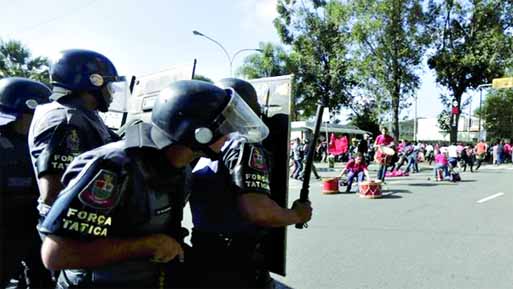
Although organising a Football World Cup never brings economic benefit for a host country, Brazil is likely to earn more than $11 billion revenue from this year’s World Cup, 20 times higher than what South Africa earned from the previous World Cup in 2010.The Brazilian government has already spent $11 billion for the tournament, with the majority of money spent on building the stadiums, improving highways, subway systems, airports and ports.Meanwhile, police in Sao Paulo have used tear gas to disperse a protest against bad governance and alleged excessive spending on hosting the football World Cup, hours before the Brazilian city hosts the opening match.The violence occurred about 13km (8 miles) from the Sao Paulo stadium where Brazil will play Croatia at 20:00 GMT.At least one protester was arrested and a CNN journalist was injured. Protesters had tried to block a road leading to the stadium where the opening ceremony will take place, report agencies.Further protests are planned in other Brazilian cities over the expense of hosting the tournament.TV footage in Sao Paulo showed riot police using tear gas and rubber truncheons to disperse about 50 protesters near a metro station on the route to the Arena Corinthians.Police moved in after the demonstrators refused to clear the road. The demonstrators had been chanting “there won’t be a Cup”.Rejecting criticism of overspending on the World Cup and widespread skepticism that the country is not prepared to host the sporting extravaganza, Brazil’s President Dilma Rousseff said in a nationally televised address on Tuesday that the country is ready for the event and claimed that it would eventually help boost Brazil’s infrastructure and economy.”The result and final celebration are worth the effort,” Rousseff said, defending the $11 billion expenditure on the World Cup. “Brazil overcame the main obstacles and is prepared for the Cup, on and off the field.”South Africa’s World Cup in 2010 did not turn out to be an economic success as only 309,554 people arrived to witness the events out of the estimated 450,000 visitors. The African nation made $513 million from the World Cup.South Africa is the best example in recent years of the “World Cup effect,” in which host countries are more harmed economically from hosting the event. The country, which was ecstatic to host its first World Cup, estimated revenues of $900 million and ended up making about 60 per cent of that. By the end of 2010, South Africa had made back only 11 per cent after a $4.5 billion investment to build and renovate stadiums and infrastructure.Will Brazil go the same road? Sport economists like University of Maryland professor Dennis Coates think so. “There is no evidence that the benefits promised by event organizers have ever materialized,” he said in a study, which pointed out that when the World Cup was hosted by the US in 1994, the average host city experienced an income reduction of $712 million relative to predictions.However, the Brazilian Institute of Tourism estimated that around 600,000 tourists will visit the country to witness the mega event and the visitors will spend approximately $2.6 billion, while the 30 lakh (3 million) Brazilians estimated to attend will spend about $7.9 billion.”Most of this spending is predicted to come from 30 lakh domestic tourists keen to support the Brazilian team. Brazilian tourists are likely to visit host cities for an average of ten days,” said Leandro Garcia, an economist of Brazilian Tourism Ministry. The World Cup will be staged across twelve cities include Rio, Sao Paulo and Brasilia in Brazil. Despite Rio’s worldwide fame for tourism and the fact that it will host the World Cup final, the city that is expected to receive the most visitors is Sao Paulo.”Around 595,000 tourists are expected in Sao Paulo because the city will be the main air travel hub. Some people should take advantage of their stop in Sao Paulo and stay for the local games,” Gracia added.

